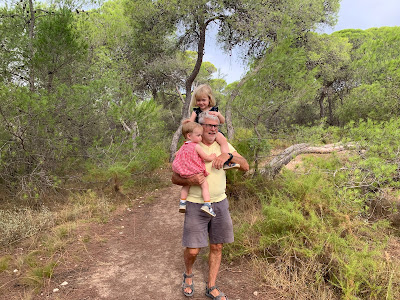It was a great success, our trip to Strasbourg. Despite the logistical challenges of putting together a trip involving sixteen people. And despite the best efforts of French Air Traffic Controllers, ably assisted by Ryanair, to make those challenges insuperable.
It all started way back in February. Two friends from our time living in Strasbourg, capital of the Eastern French region of Alsace, came to visit us in our present home in Valencia. Danielle took them to a session of her dragon boat club. Dragon boats, as I’ve mentioned before, are a Chinese invention and the paddling action required to drive them through the water is particularly beneficial for people who have had surgery for breast cancer. Not all the club members are Breast Cancer Survivors, though many are.
Having met the Valencian dragon boaters, one of our Strasbourg visitors announced, “why don’t you all come to see us in Strasbourg?” The suggestion was greeted with a level of enthusiasm which more than astonished us. Within days, sixteen had signed up for the trip.
 |
| Dragon Boaters with a Strasbourg Dragon |
The feeling was that it would be good to show them as much of Strasbourg and the region around it as possible, during the week they would be there. There were visits around the city itself, including the opportunity to try various Alsatian delicacies (in particular, tarte flambée – the Alsatian answer to pizza – and choucroute, the superior French version of what the Germans call sauerkraut). There was even a guided tour of the wine cellar in the hospital. Yes, the huge and prestigious teaching hospital in Strasbourg has its own wine cellar, and the wines are superb. One of them, perhaps one that wouldn’t be deemed superb if anyone ever tasted it, is the world’s oldest white wine still in a barrel, where it’s been since 1472.
 |
| The guide to the hospital cellar (left) with his interpreter into something like Spanish (that would be me) |
There were also visits to nearby Germany, including a swim in the famous baths of Baden-Baden, followed by a typical meal (everything ended with a meal: it was a blessing to have no access to bathroom scales while we were there) – up in the Black Forest, and on another day, back in another part of the Black Forest, to the picturesque town of Gengenbach.
 |
| Walking in the Black Forest |
 |
| Valencians enjoying a boat trip around Colmar |
 |
| Canoeing down the River Ill |
Since by happy coincidence we’d planned the trip for the same weekend as France was having a Heritage Day, at the end of the canoe trip they laid on a visit to the monastery church of Ebersmunster, which we’d seen many times from outside when we lived in the area, but never previously visited. Sport and culture combined with a fine meal afterwards: it’s a combination to die for.
 |
| Valencian visitors listening to an organist in the monastery at Ebersmunster |
 |
| Dragon boaters out rowing in Strasbourg |
At 11:30 at night, with take-off due at a depressingly early hour the following morning, Ryanair announced that the French controllers’ strike meant they’d be cancelling the flight. We were already in bed when we received the anguished message, with the question, “is there anywhere else we can fly to?”
The answer to that question was, fortunately, ‘yes’. The joint French and Swiss airport of Basel is almost as convenient a point from which to get to Strasbourg as the airport (near Baden-Baden) to which Ryanair flies. My admiration is boundless for the determination of the Valencian travellers, fully equal to their enthusiasm, which allowed them to rebook sixteen seats, at remarkable speed, on the Easyjet flight to Basel. That meant waking people up to get their passport details, but it was all done within less than an hour.
Of course, things weren’t entirely solved even then. Two minibuses were due to collect the visitors from Baden-Baden; now they had to go to an airport nearly twice as far away, and at a completely different time of day. Indeed, we couldn’t even say at what time, since the Valencians spent three hours in the plane stuck on the tarmac, presumably while Easyjet tried to negotiate itself a flight path avoiding French Air Traffic Control (eventually, the passeners got a wonderful view of the North Italian lakes, as they went a long way around). At one point, our friends sent a photo of steps being brought to the plane, suggesting that this flight too might be cancelled, but it turned out it was only so the doors could be opened to let in air.
Negotiations with the minibus company proved tricky. Not quite at the level of Northern-Ireland protocol of the Brexit Agreement, but not far off.
In the end, though, it all worked out. Choucroute was eaten. The canoe trip and visit to the Church went well. The evening was outstanding, with tarte flambée providing diners a lot of pleasure and the Valencians teaching the Pink Ladies how to dance flamenco. The visits to Colmar and to the Black Forest were highly enjoyable. And getting out on the water with the Rowing Club of Strasbourg was an experience described by the participants as encantadora.
Lots of new friends were made, across borders, which always strikes me as hugely positive. That, of course, was inevitable given that the welcome offered to the Valencians was so warm-hearted. And the Valencians, not the kind of people to pass quietly and unnoticed along a street or in a restaurant dining room, responded boisterously, with laughter and fun. Who could want more?
 |
| Launching plastic ducklings |
It was a tiring week, but it will leave us unforgettable memories. To be added to, no doubt, when the Pink Ladies come back to visit us in Valencia. For dragon boating and paella, beach walks and lentils, flamenco and rich red wine.
Something for us all to look forward to.
 |
| Saying goodbye to each other |




_society_beauty_and_author_by_GH,_Chatsworth_Coll..jpg)






